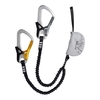François Legrand

 1 / 1
1 / 1 Francesco Tremolada
Francesco Tremolada
Everyone in the climbing community has heard of François Legrand.
His almost complete domination of the competition circuit throughout the 90's is legendary.
He is someone who undoubtedly climbs fantastically well, someone who also never ceases to amaze for the ease and intelligence with which he dispenses one hard route after the next.
And now, as a family man with young child, he still shows no sign of slowing down at all.
We'd arranged to meet in the climber's bar in Arco, and chatting over coffee and brioches we found out about his past, what motivates him, and how he sees the future of this sport...
Tell us a bit about how you started climbing?
My parents introduced me to climbing when I was about 2-3 years old, but they were a bit disappointed when I chose to become a sports climber. They didn't agree with my decision; my father, who is a Mountain Guide, thought that the only way to live with the mountain was to become a Mountain Guide, but I didn't want to follow in his footsteps - I wanted to be a sports climber.
So, when I was 18 and had to choose what to do, I left and went to Buoux where I climbed and lived in a cave for several months. Then I started traveling. It wasn't easy without money; I wanted to be independent but I needed help from the others. I'm extremely grateful to all those who helped me - even though I never asked, they were always there for me. I'm a proud person and I waited until I had achieved something before returning home; I wanted to prove that I could do it.
It would be difficult now to go back and live in a cave, without any money, but at the time it didn't feel that hard because I was free. I was young and doing what I enjoyed; it was a great experience. That kind of lifestyle is difficult to keep up in the long run, but to do it as I did when you're young is good. You learn that you can't continue like that forever, that it's O.K. for a certain period, but then you want to achieve the other goals you've set yourself. In life you need to know what you really want, otherwise you like things but never achieve anything.
I imagine that you're concentrating on Rock Master now?
Yes, but I'd prefer not to talk too much about the comp, because at the moment I'm not feeling too good. But I hope to feel better soon because I really like Rock Master and I've always arrived here on top form. But above all I'm preparing for the end of the year - this is really important - I'm in second place in the World Cup and there's only one comp left. Bindehammer is first and François Petit is third: we're all very close and the final will be conclusive.
Do you feel "under pressure" to win or to be one of the favorites?
No, I think less about it now than a few years ago. On a certain type of route I can still hold my own, but I never consider myself to be the favorite, and even less so now. Here at Arco I don't feel any pressure, I just want to have a good comp and the only thing that's important is to climb well. There is perhaps just one comp that I'd really like to win, and that's the World Championship. Perhaps I'll feel the there pressure a bit, not from the others but from myself: I want to arrive on from and if I ruin everything by climbing badly I'll be very disappointed.
At times one has the impression that the route setters can greatly influence the outcome of a competition...
I know, and we all need to talk about this, climbers and route setters alike, so as to realize exactly what we're doing. Climbing isn't all about strength; the comp should be a mixture of technique, tactics and also strength.
It seems however as if the routes are becoming ever more powerful...
Also because the route setters have less and less time to devise a route. But it's important that they remember that there is more to climbing than just power.
You've practically answered my next question, and that is, what do you admire most in a climber: technical ability, tactical ability, or strength?
I don't know, but I rely more on technical ability than strength. But if competitions become solely a question of brute force, then that can't be good for our sport. Throughout my career I've had so many satisfying experiences and I'll continue to compete because I still enjoy competitions. But if the routes become more powerful and less technical, then I'll stop.
Is more strength required because routes are becoming ever steeper?
No, no, because there are plenty of new holds which enable you to make something good on routes which aren't that steep. There are some large holds, not jugs, but rounded slopers, which enable you to set technical routes, with dynos, crossovers, footchanges, heelhooks, egyptians, a bit of everything. The only problem is that route setting is harder and more time consuming.
What do you mean when you talk about technical routes and "technique"?
It's hard to put into words, but a route is technical when something has to be discovered, when something isn't obvious. Precision, when you need to place your foot or hand in a precise spot, or even when you need to put your body into a really weird position; all of this is technical. if the routes are too simple, where there are small holds everywhere for your feet, then that isn't technical at all.
Could the idea of "technique" losing importance be due to the fact that some athletes are "born" on artificial climbing walls?
Some time ago all top climbers climbed mainly outside and only sometimes inside, now though the champions have begun to climb inside only, and this is true of some route setters, too. This is a big problem because even though climbing walls have become more technical, they are never like real rock. I'm certain that it's much harder to improve one's technique indoors.
Wouldn't it be logical to train indoors for climbing competitions?
Yes, but there are still some strong climbers, like Yuji Hirayama or Cristian Brenna, who tell me that training on plastic just isn't enough and that to be on form, both physically and technically, they need to climb on rock.
How can you explain this?
Because climbing on rock is very different from climbing on plastic. It's much more complex, it requires different muscle groups, you need to control yourself physically much more, you use your hands and feet in a completely different way. When you don't climb on rock you lose a lot and you don't feel good. When I don't climb much on rock, I don't climb well in competitions.
This seems a bit strange...
Yes, and in fact there are some strong climbers like François Petit who never climb on rock, and when they do perhaps it's only to take photos for climbing magazines; I like François, he's honest, a good person, even if we don't share the same ideas about climbing and we train in different ways.
Is there a crag you prefer?
In France … everywhere. I like the crags close to home like Buoux. I've had some "adventures" there, and I lived there when I first left home, so whenever I go back there I remember without even trying to remember. It's strange; I arrive there and immediately feel good. I also like its climbing style, pulling on pockets comes naturally, I get the impression that I'm working but not making any effort... on small edges this isn't the case. And then there are other places that I like, like Les Calanques; they are very beautiful and the sea is incredible; then there's the Verdon, which is a place different from all others because it's so high up; Buoux, Calanques and Verdon: these three are perfect.
And in Italy?
In Italy there is always Arco, all of it together, not just Massone or another crag. Because it's quick to get from one crag to the next. And there's also the fact that here in Arco I don't feel like a tourist, I know almost everybody, so it's perfect - I feel like at home, without actually being at home. But I don't know much about other areas in Italy
And elsewhere?
Then there's America. I've been there ten times and I like it, because they respect nature, there are vast open spaces; I've never seen anything like it elsewhere. But I haven't been to Australia and I imagine that it's similar over there.
There are few 8c's in Italy, but when the top Italian climbers go to France, they manage to climb 8c's quickly. Do you think there's a problem of overgrading in france, or undergrading in Italy?
I haven't tried many hard routes in Italy but those that I have weren't undergraded. Perhaps the top Italian climbers are a bit lazy: it's easier to go to a foreign country and do a hard route when you're motivated and on form than cleaning and freeing a nice line at home. Severino Scassa cleans and climbs new routes - I like this, whereas many others devote more time to repeating than to putting up new routes. But the Italians are capable of doing hard routes, because when they travel that's exactly what they do. I think that almost all top climbers have put up hard new routes. It's good that there are some climbers who bolted try hard projects, like this grades get harder, otherwise...
Have you done this?
Yes, and i still have many projects at home. Last winter I bolted a very difficult route at Les Goudes, Calanques, and trying it I hurt myself, but I hope to get back on it this winter.
How hard will routes become?
I don't know . This is the hardest route I've ever tried, but I've never done any routes harder than 8c+. Perhaps it'll be 9a, not more, but definitely 9a.
What would you have done had it not been for competitions?
I'd have done more hard routes and travelled more. I started competing in 1988 when I was 18 and had been climbing for 15 years. I wanted to be a professional climber and this was the easiest way. Being a professional climber meant living off my passion and this isn't easy in our sport. it's difficult to be recognised for just repeating hard routes. And I liked competitions, also because they were a personal challenge.
Do young climbers receive any funding from the French Climbing Federation?
Yes, this is one thing that works well, also because initially there were champions with strong personalities who dragged everything on; now the federation has understood that, if it wants to remain at the top, it must help young climbers start well; it must work in schools and organise competitions. Another important factor is that many strong climbers are now role models for the younger generations. The French way of climbing is easily recognisable - it induces imitation.
Was Patrick Edlinger one of these models?
Edlinger was definitely a role model for me; he was the most famous climber, almost the only one who made films. I appreciated the beauty of his movement, but I never agreed with his notion that climbing was something extraordinary, dangerous, inaccessible, it seemed as if he only ever climbed solo. I've never interpreted climbing in this way; I started when I was very young and climbing was something normal to me, I've never really been scared.
But there are also other climbers, like Antoine Le Menestrel or Didier Ramboutou or Isabelle Patissier who were fantastic role models. What influenced me most was Antoine Le Menestrel's way of interpreting climbing; he was really into his climbing, he could picture what he was doing, he controlled everything. I wanted and was fortunate enough to climb with him, and I learned a lot.
Can you think of any young climbers who have the charisma, the personality to become a role model in the future?
I don't know many young climbers. I do think it's strange that there are few young climbers who climb as we used to: every holiday we managed to find a way to go down to the south of France, it was a bit of an adventure. Climbing lately has changed, and that's fine; it's recognised as something "normal", whereas 10-15 years ago it was very different, and I'm glad I experienced what I did.
I like Chris Sharma. He's very strong; we have a completely different climbing style, but I like him for who he is - he doesn't want to prove that he can win everything - if he likes the route, then he'll try it, if he likes the boulder problem, then he'll try that. He stays in America for 6 months and we hear nothing of him, then he comes here and wins!
Among the young climbers he's the one to look out for in the future, but I really don't know many others and I'm sure there are others out there.
A final question about your immediate future: how long will you continue to compete?
I don't know, I don't want to choose an age or particular date when to stop. I still enjoy this way of life, competing, training and travelling. When I get fed up of training, or competitions get too hard, or when my body starts getting too tired, then I'll stop. But for the time being I'll continue.
Nationality: French
age: 29 years
profession: professional climber
Victories:
Rock Master Arco '90, '94, '97, '98
Rock Master Serre Chevalier '91, '94, '96, '97, '98
World Champion '91-92, '93-94, '95-96
World Cup (final result) '90, '91, '92, '93, '97
European Champion '92
French Champion '92, '93
X-Games '97
Sponsors
La Sportiva, Beal, Petzl, Oakley, Sint Rock, The North Face



 Copia link
Copia link



























